Van Gaal at Bayern: When Louis averted a crisis – then talked himself into a bitter exit
When he took over at Bayern Munich in 2009 the Bavarians were in turmoil. Having described himself as “self-confident, dominant and arrogant” in his first press conference, the Dutchman transformed the club, taking them to a league and cup double. But how? Uli Hesse explains…
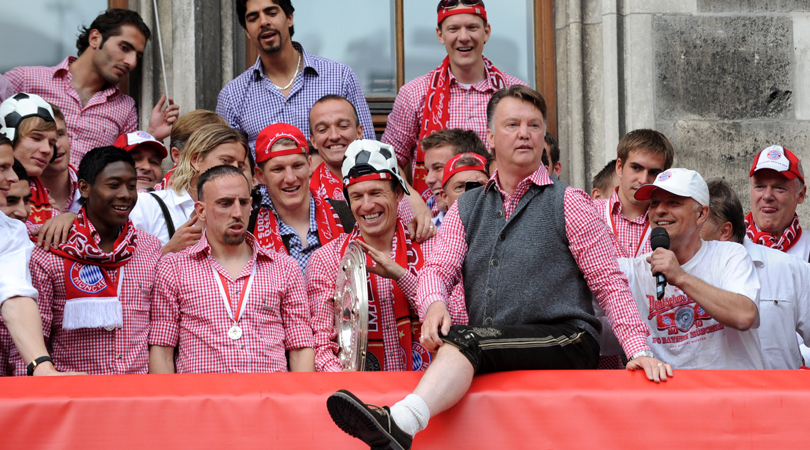
When you search the internet for ‘Van Gaal alias Feierbiest’ you’ll find an astonishing two minutes and 12 seconds on YouTube. They show the Dutch coach, dressed in traditional Bavarian garb, standing on the balcony of Munich’s town hall to celebrate the 2010 Bundesliga title with his Bayern squad, two weeks before the Champions League final.
Van Gaal grabs the microphone and, like a seasoned Las Vegas entertainer, needs only a few glances and small gestures to quickly have the sizeable crowd below eating from the palm of his hand. But he doesn’t stop there. He whips the masses into such a frenzy that many observers would later remark how the spectacle reminded them of a Nuremberg rally rather than a title celebration.
That brief film tells you more about the Manchester United coach than this article ever could. However, you’ll need this article to understand what it is that you are watching; for instance, why the fans are chanting “On your knees!” and what Louis van Gaal is chanting with increasing fervour (not to mention what ‘Feierbiest’ means). So let’s start with some background.
Not George Clooney
Bayern knew that the Dutchman possessed such an ego that even the close friends back in Noordwijk with whom he played bridge called him ‘The King’
When Bayern appointed Van Gaal in the summer of 2009, they were looking for two things: experience and discipline. Both had been in short supply of late, mainly because the club had made an error of judgement that now needed to be rectified. A year before, in 2008, one of the great iconic coaches in Bayern’s long history, Ottmar Hitzfeld, had retired from club football.
The Munich giants decided to take a gamble and replaced him with a promising younger coach who was bubbling with ideas but had never coached a club of this size before. Sound vaguely familiar? Well, Bayern’s choice back then was even more daring than Manchester United’s decision to have David Moyes succeed Sir Alex Ferguson. That’s because Bayern picked someone who had no coaching experience whatsoever in league football – Jurgen Klinsmann.
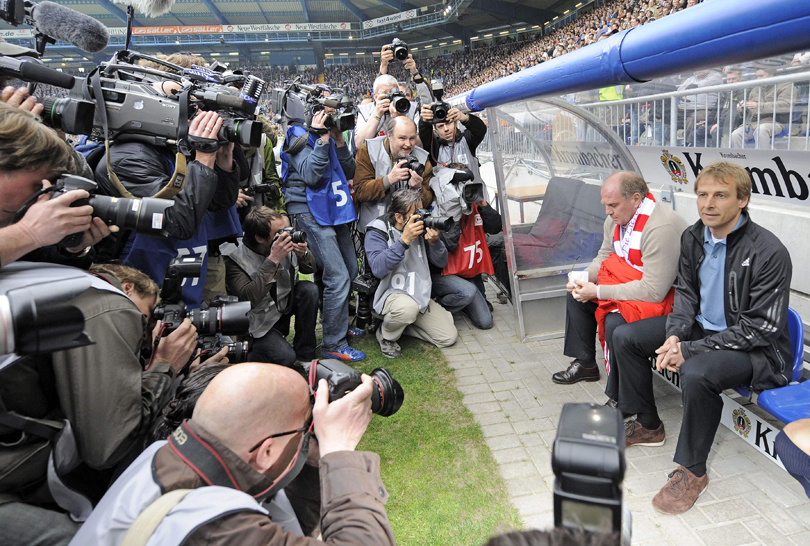
The Klinsmann gamble failed almost as badly as the Moyes experiment. While Bayern managed to stay in the title race and eventually qualified for the Champions League, they arguably did so only because Klinsmann was fired in April and caretaker manager Jupp Heynckes then guided the team to four wins and one draw down the final stretch.
Get FourFourTwo Newsletter
The best features, fun and footballing quizzes, straight to your inbox every week.
You can tell how disastrous Klinsmann’s brief reign was from the fact that Bayern swung from one extreme to the other the instant he was gone. Having tried a media-friendly, charming novice coach they now went directly for someone who had a reputation as a gruff slave-driver but also possessed one of the most impressive track records in the game.
Bayern did not enter into the relationship dewy-eyed. They knew that the Dutchman possessed such an ego that even the close friends back in Noordwijk with whom he played bridge called him ‘The King’. In all likelihood, the club had also heard that Van Gaal’s daughters addressed him in a formal manner, not unlike the way American children in the 1950s used to call their fathers ‘Sir’.
RECOMMENDED 'He couldn't move as quickly as he can talk now': Van Gaal's former team-mates speak
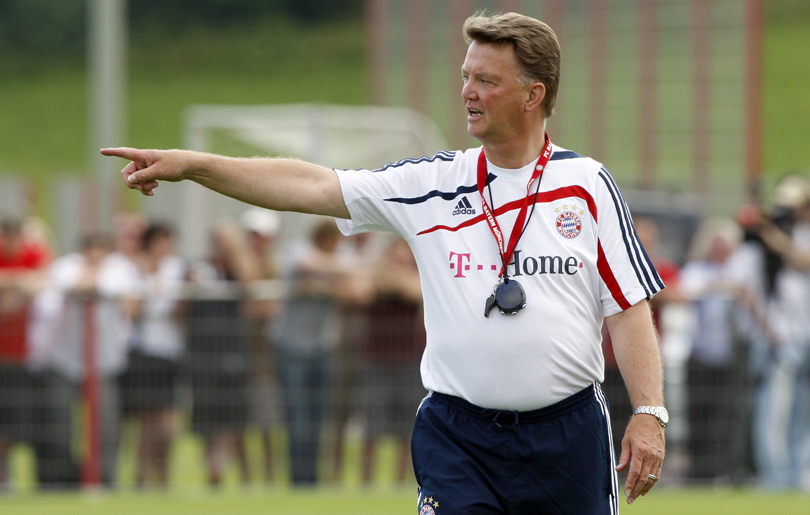
But the Bayern honchos probably suspected that some of those reports had been blown out of all proportion. Wasn’t it a perfectly normal – if slightly old-fashioned – custom in the Netherlands to speak to your parents in such a respectful manner? And in any case, as chairman Karl-Heinz Rummenigge told the press: “If we had wanted to sign everybody’s darling, we’d have gone for George Clooney.”
Speaking of actors, on the day Van Gaal put his name on the dotted line, neither Rummenigge nor anyone else at Bayern can have imagined that the Dutchman’s stay in Munich would have all the ingredients of a classic Greek tragedy – from triumphs and tribulations to hubris and humiliation.
Getting acquainted
The club is like me: self-confident, dominant, arrogant, honest, hard-working, innovative – but also cordial and familial
When Van Gaal held his first training session on July 1, 2009, hardly an account failed to mention that he carried a whistle and a stopwatch – “old-school accessories”, as the Suddeutsche Zeitung put it, in an effort to underline the difference between the proficient Dutchman and Klinsmann, with his crazy modern ideas (the German had urged his players to attend yoga classes).
The journalists quoted Van Gaal as saying that the club’s culture fit him like “a warm coat”. And they lapped it up when he added: “The club is like me: self-confident, dominant, arrogant, honest, hard-working, innovative – but also cordial and familial.”
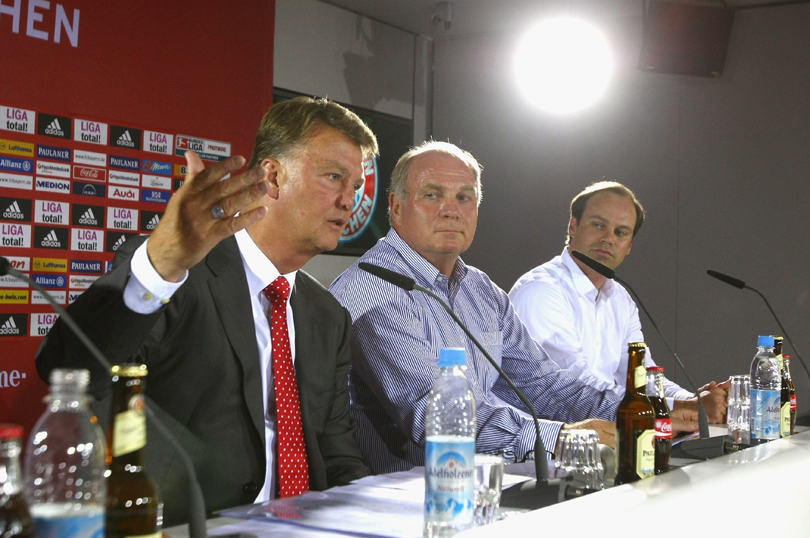
In short, Van Gaal’s first morning on the new job was a media success. The one worrying sign was either unheard or not taken seriously. Van Gaal proudly quoted the club motto: “Mia san mia,” he said, Bavarian slang for “We are who we are”. But then he added: “And I am who I am.”
The honeymoon ended almost in record time, after barely four months, because something got in the way that has been known to topple even the mightiest kings and most famous football coaches: results. Or rather, a lack of them. Van Gaal, one of the architects of the Barcelona school of football, tried to teach the team, fresh from Klinsmann’s smash-and-grab approach, a possession game built around short passes – and seemed to fail spectacularly.
Early issues
If I was gone now, whom would Bayern sign? Ferguson? Capello? They might be more successful, but they are unavailable
In late November, Bayern were in an unheard-of seventh place in the Bundesliga. Their league form was so bad that Van Gaal made the sort of change that is often dictated by panic – he benched the highly-touted young goalkeeper Michael Rensing and replaced him with the veteran Hans-Jorg Butt just four weeks into the season.
Even worse was the situation in the Champions League. Following two defeats at the hands of Bordeaux and a scoreless draw at home against Juventus, Van Gaal’s team almost needed a miracle to survive the group stage. The press speculated that King Louis would be sacked before the winter break and all he could say to such rumours was: “If I was gone now, whom would Bayern sign? Ferguson? Capello? They might be more successful, but they are unavailable.”
It was an uncharacteristically sheepish remark. In fact, such a sudden display of modesty was the only good thing to have come from Bayern’s worst start to a season in four decades. A conceited Dutch coach who called himself arrogant without any hint of irony was bad enough as far as the German media was concerned – but a conceited Dutch coach who was also losing games had become a welcome target.
Club president Uli Hoeness said: “Right after that first press conference, I told Van Gaal that describing himself as ‘arrogant’ would one day blow up in his face.” And it did. The Rheinische Post newspaper from Dusseldorf said the coach alone was responsible for the dismal situation and listed no fewer than seven crucial mistakes; for instance, that the “tactics fanatic” Van Gaal lacked a precise plan and was aimlessly shuffling his players around. Or that he was engaged in “a possibly fatal struggle for power” with Franck Ribery, who felt misunderstood and considered himself played out of position.
Others complained that Van Gaal had been desperate to sign his countryman Arjen Robben even though the player was known to be highly injury-prone. Needless to say, Robben missed the first weeks of the season.
The coach wanted to make clear to us that he can bench any player – it was all the same to him because, as he said, he had the balls. He demonstrated this literally, by dropping his trousers
Ribery wasn’t the only star player the coach had angered, or was about to. Brazilian defender Lucio left the club and joined Inter less than three weeks after the Dutchman had taken over. He later said: “Van Gaal has hurt me more than anyone else in football.”
Striker Luca Toni went back to his native Italy a few months later, during the winter break. He would soon reveal that Van Gaal had used some bizarre methods to show the more prominent players who the real boss was: “The coach wanted to make clear to us that he can bench any player – it was all the same to him because, as he said, he had the balls. He demonstrated this literally, by dropping his trousers. I have never experienced anything like it – it was totally crazy. Luckily I didn’t see a lot, because I wasn’t in the front row.”
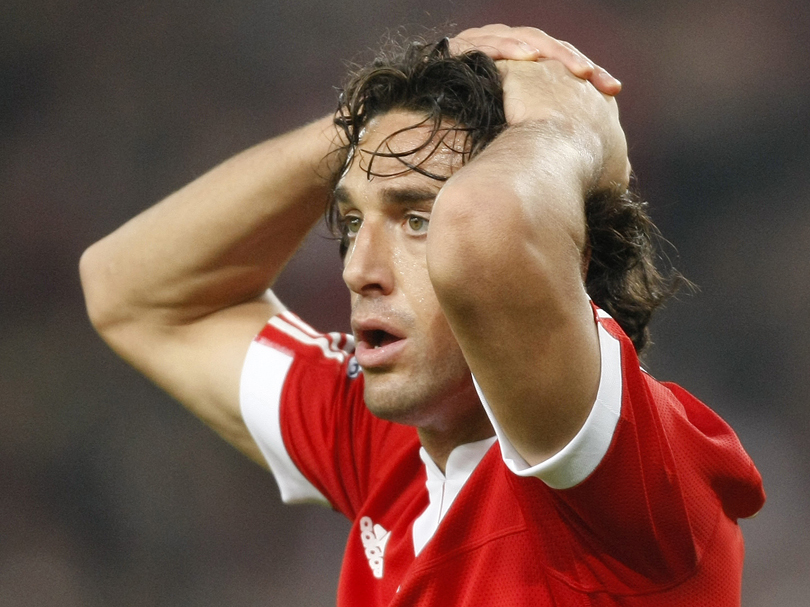
Put differently, after only a short time in Germany, Van Gaal had lost the dressing room, the media support and also a lot of football games. He quickly needed a dramatic change of fortune on the pitch. Oh, and an entirely new image off it.
The interview
On December 8, King Louis was only an hour away from having to put his head on the chopping block
On December 8, King Louis was only an hour away from having to put his head on the chopping block. Bayern had to win their final Champions League group game away at Juventus in order to reach the next round, but although they looked sharper and more lively than during any of the preceding months, they were trailing 1-0 after half an hour.
Then Bayern’s Croatian striker Ivica Olic was brought down in the box and the referee pointed to the spot. It was the first penalty the club had been awarded all season and the players looked at each other to see who had the nerve to take the most important kick in Bayern’s recent history. The man who stepped up was none other than Hans-Jorg Butt, the keeper who Van Gaal had surprisingly promoted a few weeks earlier. Butt coolly sent his fellow No.1 Gianluigi Buffon the wrong way and made it 1-1. In the second half, Bayern played Juve off the park to win 4-1. Suddenly it was a whole new season.
It was also a whole new Van Gaal. A few days after the Juventus game, he appeared on a long-running and popular sports show on television, Das aktuelle sportstudio. The show was hosted by a woman on that day and her long interview with the Bayern coach completely changed his image in Germany.
We only knew him as an obstinate, arrogant, almost narcissistic autocrat. But since Saturday night, the picture has changed
As the Morgenpost from Hamburg later wrote: “We only knew him as an obstinate, arrogant, almost narcissistic autocrat. But since Saturday night, the picture has changed. There is another Louis van Gaal. Open, humorous and charming.”
In his engaging Dutch accent, Van Gaal explained that his image as a disciplinarian was exaggerated and that his wife, Truus, actually says he is “a softie”. He spoke about the deep respect he had for his late “mommy” and said that when he was in his late 30s, he still addressed her in a formal manner, the way his daughters were speaking to him now. He smiled a lot, flirted with the host and even agreed to change into orange-coloured wooden clogs from Holland to kick a football.
Shifting suspicions
Even if Ribery and Arjen Robben are available, Muller will always play in my team
Van Gaal’s evident problems with established players suddenly appeared in a different light, too. True, he had driven fan favourites Lucio and Luca Toni away. But wasn’t it also true that both had begun to turn grey around the temples? Van Gaal instead went with young, homegrown players. He had called up a talented 21-year-old defender from the under-23 team, Holger Badstuber. And he was so enamoured of a 20-year-old forward by the name of Thomas Muller that he said: “Even if Ribery and Arjen Robben are available, Muller will always play in my team.”
Then there were Van Gaal’s decisions to put players in positions they weren’t used to. Such moves had previously been attributed to the Dutchman’s eccentricity, perhaps even an unhealthy urge to be contrary, but now they all began to make sense.
Bastian Schweinsteiger had played on the right flank for many years and never managed to really break through, not least because he didn’t have the pace of a winger. Van Gaal pulled him back, put him in front of the back four – and only a few months later people wondered why nobody had noticed before that Schweinsteiger was a world-class holding midfielder.
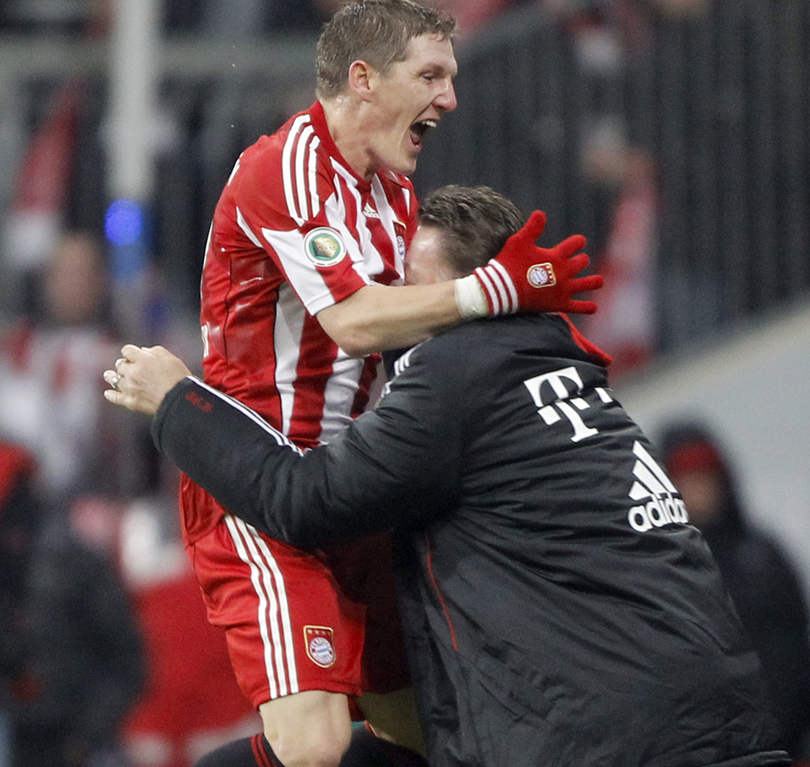
Shortly after reinventing Schweinsteiger, Van Gaal then called up a 17-year-old midfielder from the reserves and played him at left-back. When young David Alaba told a reporter that he was surprised to be used in this position, Van Gaal said: “Even if he thinks differently, he is a left-back.” Four years on, Alaba is one of the best left-backs in Europe.
With all those changes and all those bright young players, Bayern became a mesmerising team. The club had been widely loathed in Germany before, not merely because they were so successful but because they tended to win in a technocratic, business-like fashion. Now they played breathtaking attacking football.
With all those changes and all those bright young players, Bayern became a mesmerising team
Muller was nothing short of a revelation, Schweinsteiger blossomed in deep midfield, while Robben was healthy and playing the season of his life. He ran past defences at will, at home and in Europe. Bayern tore through the Bundesliga, lifted the German Cup and even reached the Champions League final.
They went into this game as the favourites against Jose Mourinho’s Inter, but the Italians (with Lucio at the back) hit them twice on the break. Still, it was a great season. The fans loved their coach and had a good rapport with the team. They had developed a celebration routine that began with the chant “On your knees!”, whereupon both fans and players would kneel down until they heard a certain key word, then everybody jumped up and fooled around.
RECOMMENDED When Jose met Louis: how the pair learned to love one another at Barcelona
Louis the Feierbiest
Van Gaal had been looking for the German expression for ‘party animal’, not knowing that it doesn’t exist
When Van Gaal became the first Dutch coach to win the Bundesliga, with a game to spare, he was asked if the players were allowed to celebrate even though some important games were still coming up. The disciplinarian – who had told his players in no uncertain terms that nobody left the table during lunch until he had finished his meal – replied: “I told my board that we will celebrate every title. I’m a Feierbiest!”
Van Gaal had been looking for the German expression for “party animal”, not knowing that it doesn’t exist. So he simply translated the words and came up with an expression that has since entered everyday language. Nobody, meanwhile, drew attention to the fact that he had just referred to the club’s board of directors as “his” board.
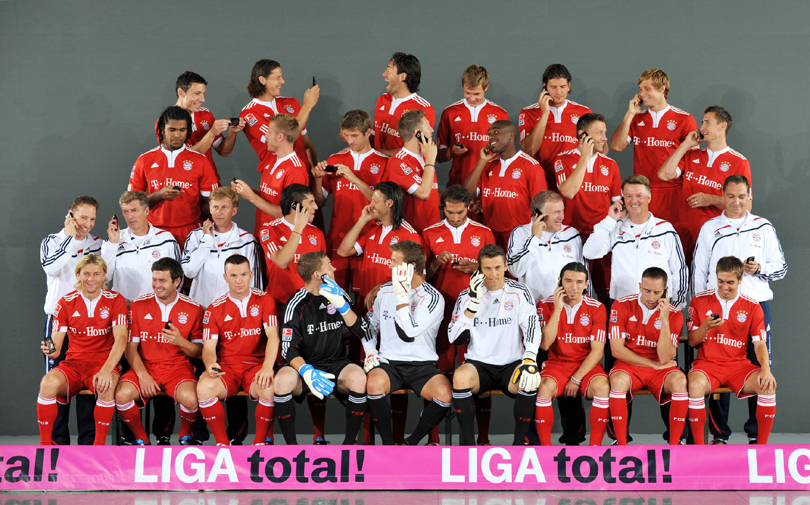
During these celebratory weeks, Van Gaal told an interviewer that he sometimes marvelled at the effect his own popularity and Arjen Robben’s outstanding performances throughout the season seemed to have had in the larger scheme of things: “I do believe that the relationship between the Dutch and the Germans has improved. That’s unbelievable. And that’s nice.”
He also said: “I have never had such a positive image.”
One-man show
Every line was madly cheered by the crowd as the Dutchman reached his grand finale. ‘We are the best of Germany. And maybe of… Europe!’
“On your knees!” the fans chanted as Van Gaal grabbed the microphone on the balcony of Munich town hall. Of course that was out of the question. Players may indulge in such follies, but King Louis would kneel before no one, not even his people. So he quickly silenced the masses and began to speak.
He said he had seen a lot of women among the crowd – “so also many mommies,” he concluded in his loveable accent. Then he sent them all “a fat kiss from the coach of the champion!”
It was the first indication that this was going to be no normal celebration speech (and made you wonder if there might be an Oedipus complex lurking somewhere in this complex psyche).
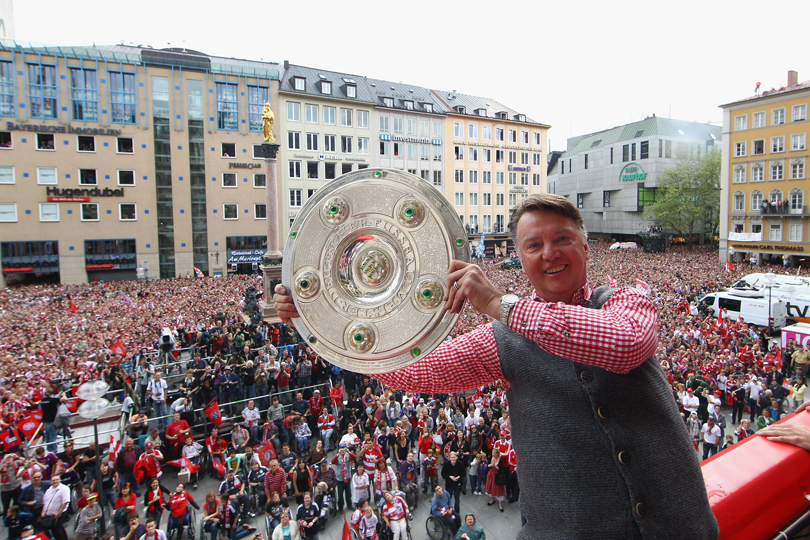
Then he got going. “Who has the best defence?” He paused for a moment before giving the answer: “FC Bayern! FC Bayern!” Then he said: “Who has the best attack? FC Bayern! And that’s why we are champions!” Warming to his subject, he became more and more hypnotic. “Not just of Munich,” he added. “Not just of Munich but also of Gelsenkirchen. Of Bremen, too. And also in Hamburg.”
Every line was madly cheered by the crowd as the Dutchman reached his grand finale. “We are the best of Germany. And maybe of…” He paused, stared at the people below and raised his finger. “Europe! Yeah!” He spread his arms wide and began to jump up and down as everyone went crazy.
Boardroom bother
Hoeness in particular was unhappy with Van Gaal’s self-centredness, and Hoeness was a man you shouldn’t cross at Bayern
He was at the pinnacle of his popularity at that moment, but behind him on the crowded balcony, among the players, stood a few people who must have wondered what they had got themselves into and whether this Dutchman was merely eccentric or plain mad.
Uli Hoeness and Bayern’s chairman Karl-Heinz Rummenigge were famous, powerful men in their own right. They weren’t used to a coach who seemed to regard Bayern Munich as his personal property, who ruled with such an iron hand that he even made sure his assistants were properly attired when they appeared in public.
Hoeness in particular was unhappy with Van Gaal’s self-centredness, and Hoeness was a man you shouldn’t cross at Bayern – a lesson Pep Guardiola may have learned from Van Gaal’s stay in Munich, because from day one the Spaniard was at pains to point out that he’d always confer with Hoeness and Rummenigge, before the former’s imprisonment.
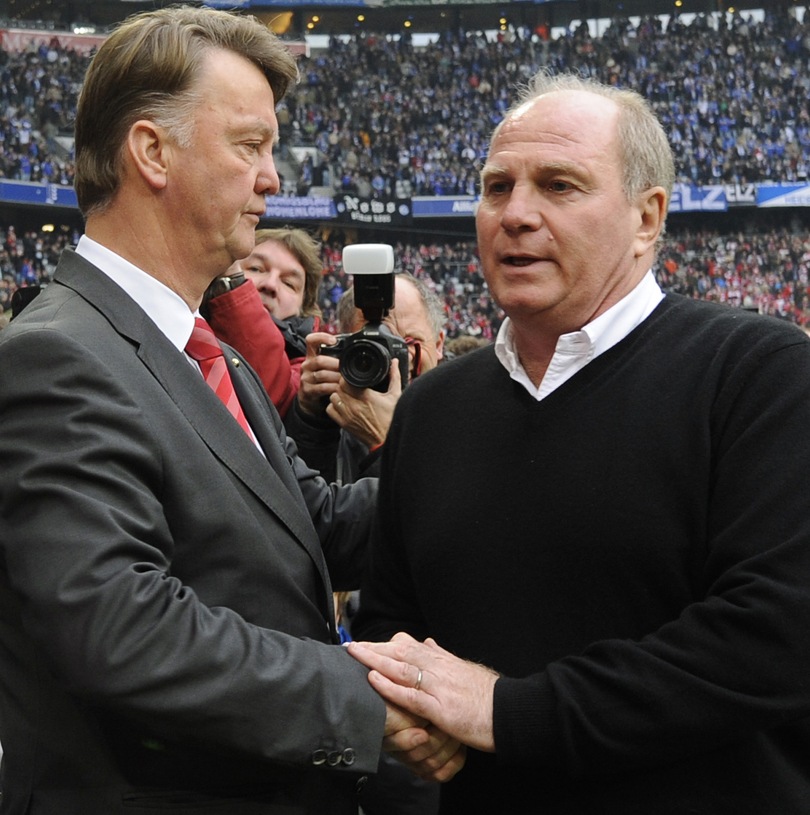
During the off-season, the club officials’ worries deepened because Van Gaal refused to bolster the defence. Not all of the signings he had made the year before had been successes. Defenders Edson Braafheid and Danijel Pranjic hadn’t really come through and so the press speculated that Bayern should go for people like Fabio Coentrao and Gregory van der Wiel.
But Van Gaal wasn’t interested. He said he had belief in another kid from the reserves – Diego Contento, just 20. And anyway, who cared about defenders? As the respected weekly Die Zeit said: “Van Gaal has built a team that knows only one direction: forward. It’s all about domination, controlling the ball far away from your own goal. That is why Van Gaal always disregards the defence.”
Downfall
Hoeness called Van Gaal ‘advice-resistant’, adding: ‘A modern football club mustn’t be a one-man show’
The new season began even worse than the previous one. In early October, Bayern were in 12th. Rummenigge was livid. “It can’t be that we are 13 points behind first place with the squad that we have,” he said.
Van Gaal was unmoved, probably because he knew that the main reason for the bad start was a string of injuries and the fact that his players were tired after the World Cup. A few days after Rummenigge’s censure, he presented his autobiography to the public. Waving a copy in the general direction of Hoeness and Rummenigge, who were in attendance as invited guests, he lectured them: “It’s important for you, too, to read this.”
It may have been the straw that broke the camel’s back. Because the beginning of Van Gaal’s end in Munich was an outburst from Hoeness on live television a few weeks later, which he subsequently revealed he’d planned long before and had been waiting for the right moment to deliver.
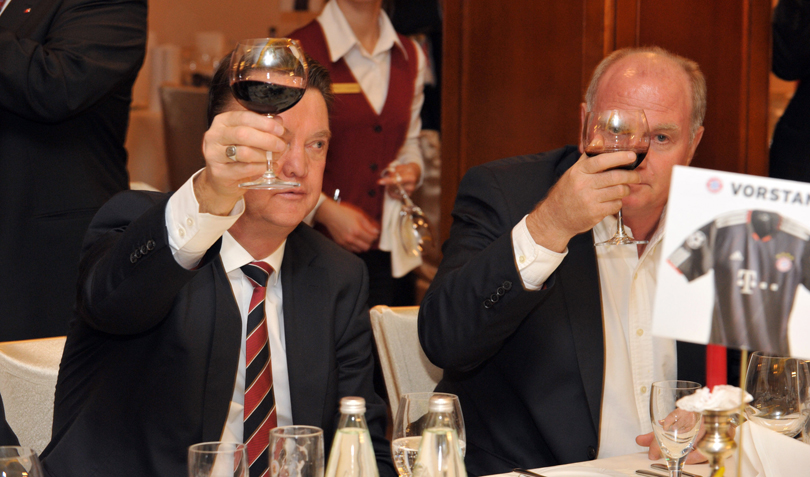
In a calm but icy voice, Hoeness called Van Gaal “advice-resistant”, adding: “A modern football club mustn’t be a one-man show.” Hoeness also said that Van Gaal had alienated many players. He closed with: “It’s difficult to talk to him, because he doesn’t accept other people’s opinions.”
During the following month there was a truce of sorts – known as the ‘Peace of Cluj’ because it happened on a trip to Romania – but never before had a Bayern official publicly attacked an incumbent coach in this way. The writing was on the wall. In early April, following a 1-1 draw in Nuremberg that meant Bayern dropped to fourth, the club fired King Louis.
Hoeness was the only one at the club who always wanted me out
Or rather, Hoeness fired him. Certainly that’s how Van Gaal viewed his downfall. A year later, he told a German magazine that “Hoeness was the only one at the club who always wanted me out”, adding that the president had far too much power.
Van Gaal said his players didn’t give him the support he had expected after Hoeness’s attack on TV, because “the president has influence on everything from the board down to the coach”.
In other words, he agreed with Hoeness that Bayern was a one-man show; they just had different ideas of who that one man was.
Closing arguments
Van Gaal represents the crucial turning point. He introduced a specific idea
To this day, there is a debate about the Dutchman’s legacy at Bayern. Earlier this year, captain Philipp Lahm said: “Van Gaal represents the crucial turning point. He introduced a specific idea – a striker, two wingers, two defensive midfielders – and shaped the club with this philosophy.”
The history of modern possession football at Bayern did indeed start with Van Gaal, not with Heynckes or Guardiola. However, when the Dutchman pointed out that much in 2013, saying that Bayern’s signing of Guardiola “bore the Van Gaal stamp”, Hoeness exploded again.
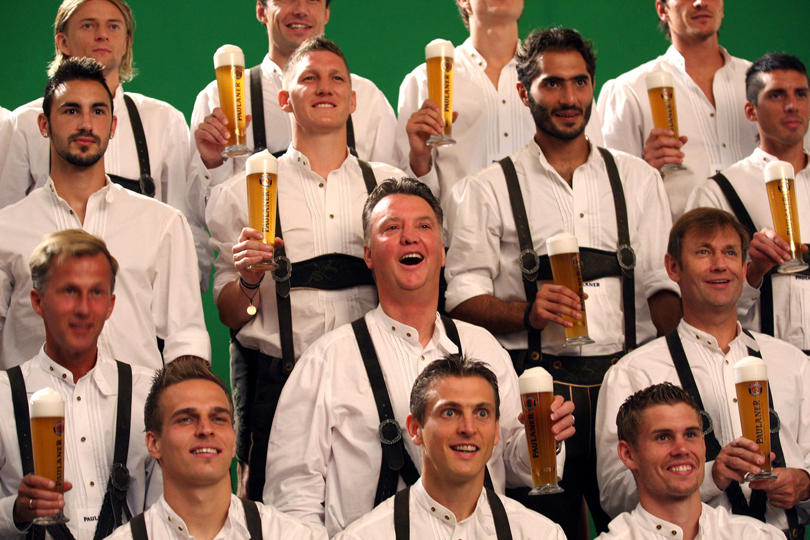
“Only Louis van Gaal can say something like this,” he told Dutch newspaper De Telegraaf. “His problem is that Louis doesn’t think he’s God, but God the Father. Before the world came into existence, Louis was already there. But the world doesn’t work the way he sees it.”
The self-styled arrogant autocrat hasn’t managed to take the biggest club in this land and restore it to its former glory. He hasn’t had much at all his own way at Manchester United. But is it really over, or does King Louis have one more turnaround in him before he settles down for retirement in the Algarve?
This feature originally appeared in the September 2014 issue of FourFourTwo magazine. Subscribe!
RECOMMENDED
